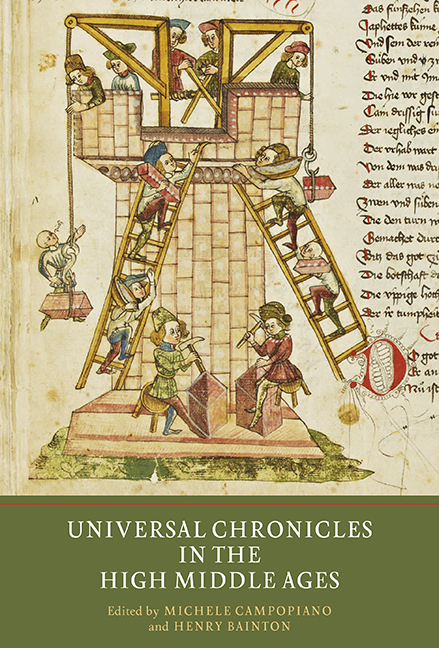Book contents
- Frontmatter
- Contents
- List of Illustrations
- Dedication
- Contributors
- Introduction: New Perspectives on Universal Chronicles in the High Middle Ages
- 1 The First Islamic Chronicle: The Chronicle Of Khalīfa B. Khayyāṭ (d. AD 854)
- 2 Universal Historiography as Process? Shaping Monastic Memories in the Eleventh-Century Chronicle Of Saint-Vaast
- 3 Writing Universal History in Eleventh-Century England: Cotton Tiberius B. i, German Imperial History-writing and Vernacular Lay Literacy
- 4 Political Didacticism in the Twelfth Century: the Middle-High German Kaiserchronik
- 5 Cosmology, Theology of History and Ideology in Godfrey of Viterbo's Pantheon
- 6 Écrire l'histoire universelle à la cour de Konrad IV de Hohenstaufen : la Weltchronik de Rudolf von Ems (milieu du XIIIe siècle)
- 7 Écrire la première histoire universelle en français: l'Histoire ancienne jusqu’à César de Wauchier de Denain et l'adaptation du modèle latin de l'histoire universelle à un public de laïcs
- 8 How Unusual was Matthew Paris? The Writing of Universal History in Angevin England
- 9 The Pillars of Hercules: The Estoria De Espanna (Escorial, Y.I.2) as Universal Chronicle
- 10 La vie d'Alexandre dans la Chronique dite de Baudouin d'Avesnes
- 11 Universal Histories and their Geographies: Navigating the Maps and Texts of Higden's Polychronicon
- Index
- Writing History in the Middle Ages
Introduction: New Perspectives on Universal Chronicles in the High Middle Ages
Published online by Cambridge University Press: 23 June 2018
- Frontmatter
- Contents
- List of Illustrations
- Dedication
- Contributors
- Introduction: New Perspectives on Universal Chronicles in the High Middle Ages
- 1 The First Islamic Chronicle: The Chronicle Of Khalīfa B. Khayyāṭ (d. AD 854)
- 2 Universal Historiography as Process? Shaping Monastic Memories in the Eleventh-Century Chronicle Of Saint-Vaast
- 3 Writing Universal History in Eleventh-Century England: Cotton Tiberius B. i, German Imperial History-writing and Vernacular Lay Literacy
- 4 Political Didacticism in the Twelfth Century: the Middle-High German Kaiserchronik
- 5 Cosmology, Theology of History and Ideology in Godfrey of Viterbo's Pantheon
- 6 Écrire l'histoire universelle à la cour de Konrad IV de Hohenstaufen : la Weltchronik de Rudolf von Ems (milieu du XIIIe siècle)
- 7 Écrire la première histoire universelle en français: l'Histoire ancienne jusqu’à César de Wauchier de Denain et l'adaptation du modèle latin de l'histoire universelle à un public de laïcs
- 8 How Unusual was Matthew Paris? The Writing of Universal History in Angevin England
- 9 The Pillars of Hercules: The Estoria De Espanna (Escorial, Y.I.2) as Universal Chronicle
- 10 La vie d'Alexandre dans la Chronique dite de Baudouin d'Avesnes
- 11 Universal Histories and their Geographies: Navigating the Maps and Texts of Higden's Polychronicon
- Index
- Writing History in the Middle Ages
Summary
Defining Universal History
The ambition of composing narratives that embrace the totality of humankind's past – or the entire history of the universe – can be found throughout the world and throughout history. Yet universal history as a practice seems to have fallen out of favour among European historians today. Ambitious projects like Oswald Spengler's Decline of the West and A. J. Toynbee's A Study of History – which traced the shape of history across many civilizations and many epochs – seem to belong to a distant past, and in any case neither was the work of professional historians, at the margins of the Rankean definition of historical research, which attempts solely to show the past as it really was (‘wie es eigentlich gewesen’). Nonetheless, historians are finally beginning to rediscover universal history, and moves are afoot to reintroduce universal history into academic curricula. David Christian, for example, has recently argued that teaching universal history at universities ‘will help students grasp the underlying unity of modern knowledge’. He also suggests that ‘only at the scales of universal history will it be possible to grasp the underlying unity of humanity as a whole. We have seen that the overall trajectory of human history cannot be seen within the constricted timescales of Rankean scholarship.’ A medievalist reading these statements will probably observe that these sentiments are hardly new. Medieval universal chronicles were already based on the fundamental principle of the unity of humankind, and allowed the reader to understand the fundamental unity of knowledge: narrating the history of salvation revealed the coherence of the Creation. The academic community is currently debating the possibility of narrating the geographical and chronological totality of the history of humanity. It is important, therefore, to consider how this totality was understood in the past.
Despite the fact that universal history has been so geographically and chronologically widespread across history, it is difficult to define the universal chronicle as a single genre. Several attempts have been made to do so, however. Karl Krüger, for example says in his volume on universal chronicles in the Typologie des sources du moyen âge occidental that they represent the entirety of the history available to their redactor in the form of writing.
- Type
- Chapter
- Information
- Universal Chronicles in the High Middle Ages , pp. 1 - 18Publisher: Boydell & BrewerPrint publication year: 2017

